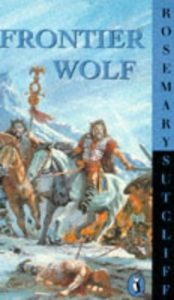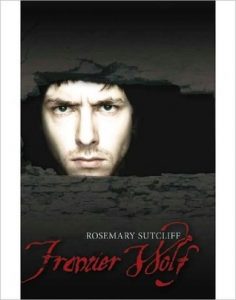Rereading Rosemary Sutcliff: A Shoutout for “Frontier Wolf”
I grew up reading and rereading Rosemary Sutcliff’s historical novels, “probably” the most famous of which are two of her Roman-Britain novels, The Eagle of the Ninth, which I believe has been dramatised twice, and The Lantern Bearers, which won the Carnegie Medal in 1959.
Sometimes, the books you’ve loved as a junior or young adult reader don’t withstand a more adult scrutiny, but I’ve found Rosemary Sutcliff’s do stand the test of time. I believe this is because her historical research is so good and also because her eye for character, ear for dialogue, sense of story pacing, and ability to convey emotional depth are all so well honed.
Frontier Wolf (first published in 1980) is another novel set in the Roman British world, ca. 343 AD according to the author’s foreword, and my re-read did not disappoint. Although it’s less well known than the two works mentioned above, I thought it was vintage Sutcliff. In most of the stories I’ve read, the protagonist either has to overcome a personal obstacle (for example, Marcus in The Eagle of the Ninth is invalided out of the army because of a wound, and must overcome his subsequent lameness to make his life new) or those generated by history (e.g. The Lantern Bearers concerns the period following the withdrawal of the Roman Empire from Britain.) In Frontier Wolf, the protagonist, Alexios, must overcome the military error and disgrace that has resulted in him being sent to an auxiliary unit on the borders of the Empire: in this case in the region we think of as the Scottish Lowlands, beyond Hadrian’s Wall.
Other elements of classic Sutcliff include Alexios proving himself to his command, the “frontier wolves” of the title; friendship and brotherhood, both among his own people and across the divide between the Romans and the British (Scottish) tribes; and experience of the battles and campaigns of the period within this personalized framework.
And because this is vintage Sutcliff, the characters, the pacing, the sense of adventure, and the emotional depth all deliver. So if you like historical fiction, adventurous stories, YA literature, or any sort of good tale, well told, then you may well enjoy Frontier Wolf. Or any other of Sutcliff’s novels, for that matter.
In terms of availability, I obtained my reading copy from Christchurch City Libraries. Owing to the popularity of Sutcliff’s writing I believe her books will still be available in most libraries. Copies are also likely to be available second hand for the books that are no longer in print.










I recently reread Mark of The Horse Lord. As a child the writing and the world fascinated me and I always remembered it ended on a triumphant note. Reading it as an adult and a children’s writer this time the writing and story wowed me again. But the triumphant note was a deliberate sacrifice made by the main character (suicide). It stunned me that the book ended this way… How could the publishers think this was suitable for children… then I thought about the edition I was holding. It’s marketed at adults or YA and features a buff guy with and intricate tattoo black and white cover. Back when I was a kid it was all warm oranges and browns with a guy on a horse. Maybe we were braver readers… I don’t think there was any distinction made for YA books as a separate section of the library shelves. Rosemary certainly knew her history and how to keep the readers riveted. It is still a great book about what it meant to be a gladiator as a way of leaving slavery back in Roman Britain.
I have never read Mark of the Horselord but now I am very interested to do so. Context can be really important I think with some subject matter…And I do think of a book like The Lantern Bearers, which also has quite tough content, as YA / crossover to adult and not Junior fiction. I also loved it as a teen reader – one of those books that made me ‘grow’.
The thing I noticed with Frontier Wolf, too, is that RS never talks down to her readers at all. Quite an achievement.
I think the thing I love most, though, is that Sutcliff’s books still standup to an adult re-read, which a lot of books I adored as a kid don’t. :-/
Asolutely agree with your comment on Sutcliffe not talking down to her readers… and YES they do stand up as an adult reread!
count me as another lover of Sutcliff. I loved MARK OF THE HORSE LORD when I found it as a child. The one that puzzled me when I read it from the children’s section of the library was DAWN WIND. Now, as an adult, I can appreciate it. But it was one of the few Sutcliffs that could not grab the younger me.
I’ve collected a great many of her books and they still hold up very well.
Did you know she did at least one fantasy picture book, too? THE MINSTREL AND THE DRAGON PUP.
I didn’t know about the picture book! And I also struggled with Dawn Wind as a junior reader, ditto Outcast, but got more out of both when came back to them with a few more years under my belt.
Am now very keen to read The Mark of the Horselord!